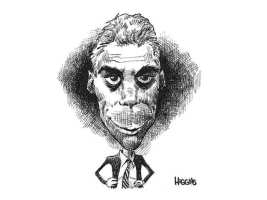
Q: What was it like running against someone with $12 million?
A: (Laughs) It’s like shaking your fist at the universe. That was amazing. I didn't think he would raise that much money. I thought he would raise $5 million at most, but $12 million? That was outrageous, and he spent it!
Q: How much did you end up raising?
A: About $540,000.
Q: Why do you think you and Dock Walls were cut out of the big debates?
A: I think because they’d already figured out who the candidates were, and the rest of us was just whoever these people are hanging around, which I think was very unfortunate. It could have been a broader dialogue. It could have been much more entertaining and educational for the voters, and I think that's one reason so few people voted.
Q: What issues did you bring up that nobody else was talking about?
A: Ex-offender issues. Murders. Us not getting a fair share of resources. I think there’s something wrong in talking only about those things, but it’s our responsibility to talk about what the challenges are across the board.
Q: Let's talk about the only time you did get coverage: when Carol Moseley Braun said you were strung out on crack.
A: And that I was a member of a cult. Who admits to that?
Q: Did she ever explain why she said that to you?
A: She hasn’t even talked to me.
Q: How do you think that changed her campaign?
A: It knocked the bottom out of it. People, everywhere I go, even now, when I was at the dentist, “You really did a great job out there. What Carol Moseley Braun said about you was terrible.”
Q: Some people say that was the reason Rahm Emanuel won in the first round.
A: I think that had a lot to do with it.
Q: The black votes didn't end up going to you and Dock Walls, they went to Rahm Emanuel.
A: People want somebody they know and they feel comfortable with. Dock Walls and I, neither of us had the media coverage or the endorsements the others had. There wasn't enough time. That happened at the end of January.
Q: After that happened, a lot more reporters showed up. Did that give you a chance to get your issues out there, once you got past the question, “Did you smoke crack?”
A: That’s the main question everybody wanted to know. People got a chance to see me, and see what kind of person I was, and people admired me.
Q: If she hadn’t said that, what percentage of the vote would she have gotten?
A: I don’t think she would still have got more than 16 percent. It would have been a runoff.
Q: Why did Emanuel do so well in the black community?
A: Barack! When he came out with his support and Clinton came out with his support and Carol acting crazy like that and Danny Davis giving up, the older people who vote all the time, they voted [for Emanuel]. I don't think he's going to be happy as mayor. The mayor's job is really boring.
Q: Did you have a conversation with him during the campaign?
A: Not until afterwards. I talked to him on the phone, and then we met in person. He wanted to know if I wanted to stay in my current job at TARGET Area Development Corporation, or work somehow with the city. I told him I was going to stay at Target. I told him what I would like to do was either be on the transition team for education or have one of my staff members there. Sharon Gordon is on the team.
Q: Did you talk to him about ex-offenders?
A: Yes. I said, “You know, in the four years that you’re here, you’ll get another 25,000 every year, to join the hundreds of thousands already there. I said, “What are you going to do about that?” He said, “I’m trying to figure out what to do. We’ve got to find a way to get them back in, because if we don’t, they’re going to keep committing crime after crime. I know how to do this from a city standpoint. We can just say, we're not going to discriminate against ex-offenders. We’re going to allow anyone to get hired here that can.” You don’t want to hire somebody who has a background to work in an area where they shouldn't work. Just non-violent offenders. He said, “But I haven’t figured out how to get that to the private sector, but I'm thinking about it.”
Q: Are ex-offenders able to get jobs with the city now?
A: Yeah. Someone just did a report. I think it was the Sun-Times. They said, “The city hires 139 ex-cons in the last two years, and people are waiting for jobs.” I’m like, “Man, it’s out of hundreds of thousands.”
Q: You said you don't think he’s going to be happy as mayor. Why not?
A: He's too energetic. He told me he lost nine pounds campaigning. He's just running around from night to day, and then he gets up early to work out. He needs a much bigger playing field than Chicago, and I guess he's going to find that out. Or maybe he might know it already. Maybe that's why he came to Chicago, to run in Chicago and try to be fair. I'm expecting him to be as fair as possible, because I think he has bigger aspirations.
Thursday, March 17, 2011
Running Against Rahm: Patricia Watkins | NBC Chicago
via nbcchicago.com
Subscribe to:
Post Comments (Atom)








No comments:
Post a Comment